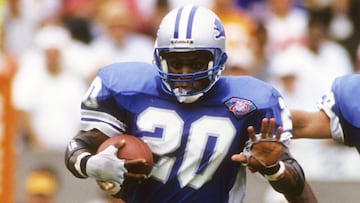Why did Barry Sanders retire so early and how old was he when he quit the NFL?
Though his now infamous decision to walk away from the game shocked the football world, the reason for the choice is completely understandable.


It’s been almost 15 years since the Lions’ iconic running back chose to end his career at a time that many thought was too early. In that time there has been much speculation about why the Hall of Famer made the choice he did and at long last he’s opened up about it.
Barry Sanders explains the reason for retirement
As any football fan knows, former Detroit Lions running back Barry Sanders called time on his career back in 1999 just as the team was heading into training camp. It was a decision that rocked the NFL at the time, as many couldn’t understand why the former MVP (1997) would bring the curtain down on his career when he was clearly in his prime. Yet, to hear the man himself tell it, there was really no other option given where he was at mentally.
The new documentary "Bye Bye Barry" explores the sudden retirement & complicated legacy of Detroit Lions legend, Barry Sanders.
— WWJ 950 (@WWJ950) November 21, 2023
On #TheDailyJ podcast, @ZachEClark speaks to Sanders himself about the film, which tells the story of why he walked away.
🎧 https://t.co/duXwrWHKx0 pic.twitter.com/atJ6TetkdO
Speaking during a scene in Amazon’s new documentary about him, Sanders explained that for him there was simply nothing else to be done. “For me, just that thing that drove me to play, which is that passion, just wasn’t there,” said the 10-time Pro Bowler. “There was nothing really left to play for. I didn’t see us as any kind of a serious Super Bowl contender. ...I felt like I was making a pretty clear decision. I just felt like, in my mind, this is pretty much it.” To be fair, those words don’t differ much from the ones he wrote when he put pen to paper in an article that he wrote many years ago to announce his retirement. ”The reason I am retiring is simple: My desire to exit the game is greater than my desire to remain in it,” Sanders wrote. “I have searched my heart through and through and feel comfortable with this decision.”
OK, but surely there’s more to Barry Sanders’ decision to retire, right?
In a way, yes. As viewers will see in the documentary, a major contributing factor to Sanders’ loss of desire which he states openly is the Lions stood at 5-11 at the time he made his choice clear. That’s to say they were most definitely not a contender and to make matters worse, had recently seen several key players depart for greener fields. Indeed, it had been a downward spiral for some time prior to his retirement. Consider for a moment that while the Lions were one win away from the trip to the Super Bowl in his third season, they didn’t win a single postseason game in any of his last seven seasons.
Thanksgiving - When the world comes to #Detroit for @NFL & @Lions football.
— Barry Sanders (@BarrySanders) November 23, 2023
Honored to have my film as part of so many fans' plans today so I wanted to thank you.
Post a pic/vid of your #ByeByeBarry watch party only on @PrimeVideo
We will be picking winners all day. #ROAR pic.twitter.com/ncVGjIunXr
In that time, he would have watched many of his teammates leaving such as Pro Bowl center Kevin Glover whose departure was a major blow for Sanders, evidenced by the fact that he called it quits that very same offseason. “You go to war and go to battle with those guys, you form a bond, obviously,” Sanders said. “Some of the guys that they may have brought in to replace those guys were just not the same, but you’ve got to take the field with the guys you practice with. ... Had that group been able to stay together, somehow, we definitely could have done much better and definitely would have won some playoff games.”
Did Barry Sanders short change himself?
Related stories
It’s the question that many have asked since. At the time of his retirement, Sanders was just 1,458 yards away from breaking Walter Payton’s legendary career rushing record. In truth, he would have probably surpassed Payton’s record that very season having come from a 1998 campaign in which he rushed for 1,491 yards, a lean year by his standards. Again, this is a guy who rushed for a minimum of 1,500 yards in each of the four seasons prior to that year and registered an astonishing 2,053 yards during his 1997 MVP season. This is all to ask the question, ‘Couldn’t he have waited a little longer?’
Most Rush TD in NFL history...
— Paul Hembekides (Hembo) (@PaulHembo) November 23, 2023
...of 10+ yards
Barry Sanders -- 51
...of 15+ yards
Barry Sanders -- 41
...of 20+ yards
Barry Sanders -- 30
...of 25+ yards
Barry Sanders -- 27
...of 30+ yards
Barry Sanders -- 23
The most electric runner there ever was. pic.twitter.com/AeLciDUmLh
Ultimately, it would be the Dallas Cowboys’ former star running back Emmitt Smith who would eventually break Payton’s record in 2002, however, many are of the opinion - Smith as well - that had Sanders kept playing he would have become the first RB to rush for 20,000 yards. At any rate, that’s water under the bridge now and where Sanders is concerned, there is no doubt that he is universally considered one of the best running backs ever to play the game regardless of records. Inducted into the Pro Football Hall of Fame in 2004 as the second-youngest player ever, it’s safe to say that Barry Sanders’ legacy is safe and secure, and most definitely rightly so.

